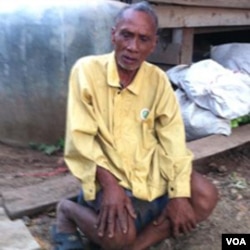Investigating judges at the UN-backed Khmer Rouge tribunal have begun contempt of court proceedings against VOA Khmer, which they said in a statement Wednesday had interfered with the court’s work by making public the contents of confidential court documents.
In August, VOA Khmer ran a series of interviews with three suspects named by court prosecutors in confidential submissions that had earlier been made public by international media outlets, including the US-based Christian Science Monitor and a New Zealand website called Scoop. In the interviews, three suspects, Ta An, Im Chaem and Meas Muth denied responsibility for atrocity crimes.
The prosecution submissions named a total five suspects in two cases, 003 and 004, which Prime Minister Hun Sen and other government officials oppose, saying further indictments at the court could hurt national stability.
The investigating judges, Siegfried Blunk and You Bunleng, have been under increased scrutiny since April, when they announced the conclusion of their work in Case 003, despite failing to interview the two suspects in the case or to visit key crime sites.
International prosecutor Andrew Cayley has since appealed to have the judges continue the investigation. That appeal is under review, and the investigating judges say they are continuing work on Case 004.
In their statement Wednesday, the judges said VOA Khmer had “quoted verbatim from a confidential document of the [tribunal] and even showed that document on a video,” and that they had “instituted proceedings for Interference with the Administration of Justice (Contempt of Court)” under court rules.
“Anyone intending further disclosure of confidential court documents is hereby warned that his case could be transferred to the National Prosecutor,” they said.
VOA Khmer chief Chris Decherd said Wednesday the service supports the work of the court.
“The role of VOA Khmer is to serve the 14 million citizens of Cambodia by reporting, producing and broadcasting news reports about the world, the US, Asia and Cambodia that are important and relevant to Cambodian citizens, who deserve and are well-served by objective and quality news reporting about issues and topics that impact and affect their daily lives,” Decherd said in a statement.
Wednesday’s statement opened broader questions over the court’s work and the role of journalists who cover it. The hybrid court was established to try former leaders of the Khmer Rouge, under which more than 1.7 million people died, and to bring victims of the regime into the judicial process for the sake of national reconciliation.
“Through my observations so far, I see that coverage of the Khmer Rouge tribunal is still limited,” said Mean Chhean Nariddh, director of the Cambodian Institute for Media. “This is because the level of knowledge among local journalists is still low. Therefore, if the court has too much restriction, it will lead to journalists shunning more coverage of the court. Their knowledge of international criminal courts like the [tribunal] is low. So they are afraid that they would end up in trouble. This is a loss for the tribunal, the international community and the Cambodian people.”
Mean Chhean Nariddh said that legal action taken against journalists could set a bad example for the domestic courts to follow.
Our Virak, director of the Cambodian Center for Human Rights, said the judges’ position was aimed at both journalists and its own staff.
“Cases 003 and 004 have attracted a lot of interest from the public, and I think that tens of thousands, up to millions, of victims have the right to know about the court’s processes,” he said. “We understand that the court seems to be failing. Therefore it seems there is a tendency to push for a proper investigation to move cases 003 and 004 forward.”
“We see that investigating judges seem to have completely failed,” he said. “That’s why there is the intention of some officials to bring this information to the public. In general, this kind of approach is pitiful, but it is necessary for a court that is failing and dragging on.”






